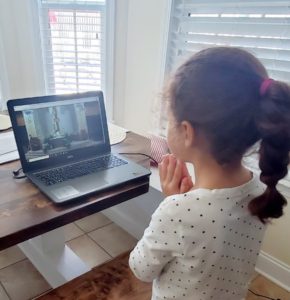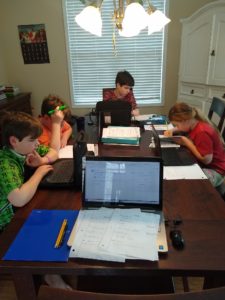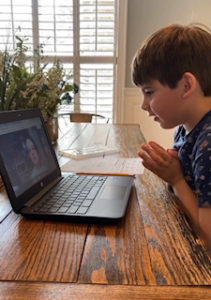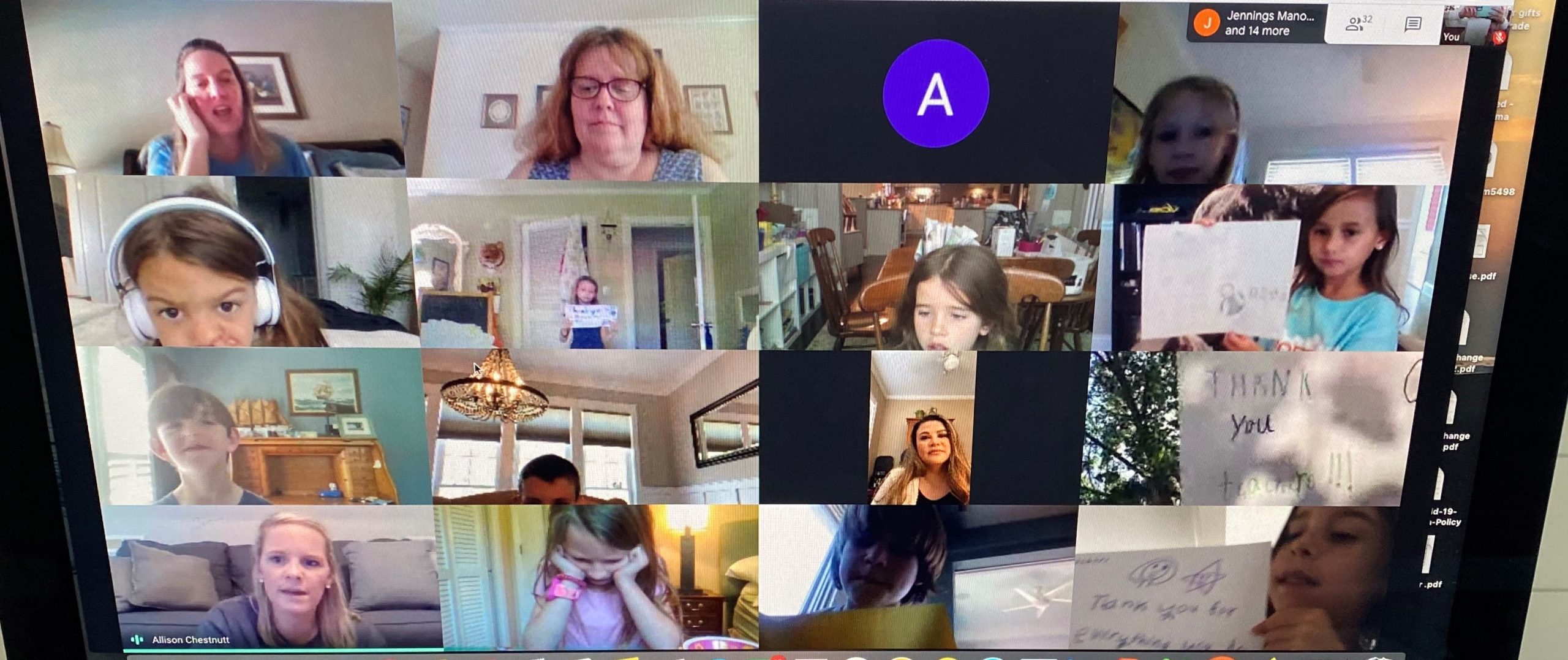The distance learning at SMCS has three main objectives:
- continue growing in our Catholic faith
- continue providing an effective education for students as quickly as possible following the need to suspend face-to-face learning
- maintain as much of a sense of normalcy as possible for our entire school community: students, parents, faculty, and staff
Below you will find our approach to remote learning along with information for how parents/guardians can support their children’s learning and considerations tailored to make the best of challenging circumstances.
Community and communication is very important at SMCS, even more so during times of distance learning. That's why we contact our families on Friday to share information on what has happened over the past week and what is to come the following week.
At the core of our approach to remote learning is the belief that we should think differently about our priorities when responding to challenging circumstances, and we should embrace new opportunities for students to learn in authentic, meaningful ways.
The SMCS approach to remote learning begins with the assertion that the learning experiences teachers design when school is in regular session cannot be simply replicated through distance learning. In particular, the invaluable social interactions and mediation that occurs naturally among students and between teachers and students cannot be recreated in the same way.
We deliberately use the term learning rather than technology-specific labels such as “virtual learning,” “e-learning,” or “online classes.” This choice reflects our conviction that quality learning can occur remotely without solely relying on computers. Our goal is for students to read, communicate, and engage in authentic learning experiences while continuing to be physically active.
The use of technology in our classes is aided by a 1-to-1 Chromebook program.
We utilize Google Classroom and Hangouts Meet to power remote learning because Google is committed to building products that help protect student and educator privacy and provide best-in-class security. Their default-on measures help keep our online classrooms secure, including:
Encrypting all data in transit by default between the client and Google for video meetings on a web browser, on the Android and iOS apps, and in meeting rooms with Google meeting room hardware.
Supporting compliance requirements around regulations including COPPA, FERPA, GDPR, and HIPAA.
Making it difficult to guess the ID of a meeting and make an unauthorized attempt to join it by using codes that are 10 characters long, with 25 characters in the set.
Leveraging Google Cloud’s defense-in-depth approach to security, which utilizes the built-in protections and global-private network that Google uses to secure your information and safeguard your privacy.
A transition to distance learning is a challenge for families. Parents need to think differently about how to support their children; how to create structures and routines that allow their children to be successful; and how to monitor and support their children’s learning. Some students will thrive with distance learning, while others may struggle. The guidelines provided below are intended to help parents think about what they can do to help their children find success in a distance learning environment.
From the first day SMCS implements distance learning, parents need to establish routines and expectations. SMCS encourages students and parents to start the day with a prayer and to set regular hours for their children’s schoolwork. Keep normal morning and bedtime routines. Your children should move regularly and take periodic breaks throughout the day. It is important that parents set these expectations for how their children will spend their days starting as soon as remote learning is implemented, not several days later after it becomes apparent a child is struggling with the absence of routine.
Your child may have a regular place for doing homework under normal circumstances, but this space may or may not be suitable for an extended period of time, as will be the case if remote learning is implemented. We encourage families to establish a space/location where their children will learn most of the time. This should be a public/family space, not in a child’s bedroom. It should be a place that can be quiet at times and have a strong wireless Internet signal, if possible. Above all, it should be a space where parents are present and monitoring their children’s learning when feasible.
Teachers will communicate with studnents through Google Classroom and school email, when and as necessary. As always, SMCS teachers welcome communication from students and parents. However, we ask parents to remember that teachers will be communicating with dozens of other families and that communications should be essential, succinct, and self-aware. We also encourage parents to have their children explain the technology systems (e.g. Google Classroom, Hangout Meets) teachers are using.
Parents are encouraged to start and finish each day with a simple check-in. In the morning, ask what is your child learning today? What are their learning targets or goals? How will they spend their time? What resources do they require? What support do they need? This brief grounding conversation matters. It allows children to process the instructions they’ve received from their teachers. It helps them organize themselves and set priorities. Parents should establish these check-ins as regular parts of each day. Not all students thrive in a distance learning environment; some struggle with too much independence or lack of structure. These check-in routines need to be established early, before students fall behind or begin to struggle.
In the course of a regular school day at SMCS, your son or daughter engages with other students or adults dozens if not hundreds of times. These social interactions and opportunities for mediation include turning to a peer to exchange a thought or idea, participating in small or large group discussions, asking questions for clarification, collaborating on group projects, and countless other moments. While some of these social interactions will be recreated on virtual platforms, others will not. Human beings learn best when they have opportunities to process their learning with others. Beyond the check-ins recommended at the start and end of each day, parents should regularly circle back and engage with their children about what they’re learning. However, it’s important that your child own their work; don’t complete assignments for them, even when they are struggling.
A challenge for families with multiple children will be how to manage all of their children’s needs, especially when those children are different ages and have different needs. There may be times when siblings need to work in different rooms to avoid distraction. Parents may even experiment with noise-cancelling headphones to block out distractions.
Make sure your children remember to move and exercise. This is vitally important to their health, wellbeing, and to their learning. Please check your students PE teacher's Google Classroom for recommended activities. Think also about how your children can pitch in more around the house with chores or other responsibilities. Don’t let your children off the hook – expect them to pitch in.
SMCS only implements remote learning if a serious emergency has occurred. Should this happen, it is imperative for parents to help their children manage the worry, anxiety, and range of emotions they may experience. Difficult though it may be, do your best not to transfer your stress or worry to your children. They will be out of sorts, whether they admit it or not, and need as much normal routine as parents can provide. Please remember our school Counselor, Mrs. Hartsfield can be a resource during this time as well.
Encourage your child to take breaks from continuous screentime. We ask that parents remember most teachers are not experts in distance learning and that it will require some trial-and-error before we find the right balance between online and offline learning experiences. We thank you in advance for your patience and partnership!
There’s always excitement when school closes. If SMCS implements remote learning, the initial excitement of school being closed will fade quickly when students start missing their friends, classmates, and teachers. Help your children maintain contact with friends when circumstances permit. Please also monitor your children’s social media use, especially during an extended school closure. Older students will rely more on social media to communicate with friends. SMCS asks parents to monitor their children’s use of social media. Remind your children to be polite, respectful, and appropriate in their communications and to represent your family’s values in their interactions with others. A student’s written words and tone can sometimes offend or cause harm to others.
Students are asked to:
Attend all Google Meets as assigned by their teachers.
Show teachers that they are engaged by contributing to class discussions and submitting completed tasks (meeting deadlines).
Collaborate with students online as asked and with teachers during and after the lessons where possible.
Complete readings and other homework that may be assigned.
Submit all assignments on time.
Students Roles & Responsibilities
Establish daily routines for engaging in the learning experiences
Identify a comfortable, quiet space in your home where you can work effectively and successfully
Complete assignments with integrity and academic honesty, doing your best work
Be proactive in reaching out to teachers when you have questions or assignments are unclear
Communicate proactively with your teachers if you cannot meet deadlines or require additional support
Collaborate and support your peers in their learning
Comply with the SMCS Acceptable Use Policy, including expectations for online etiquette
Proactively seek out and communicate with other adults at SMCS as different needs arise




